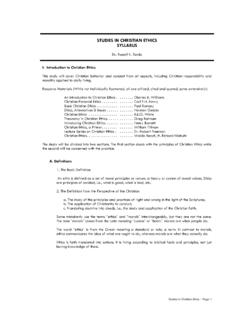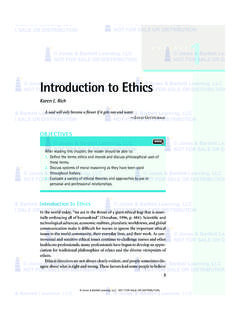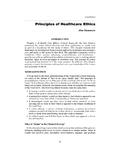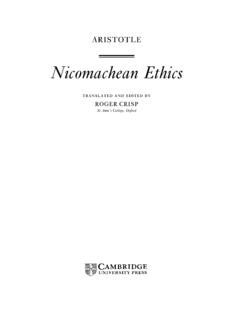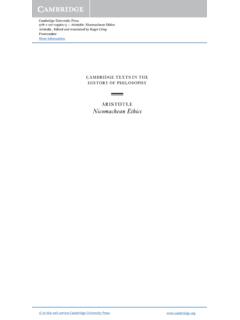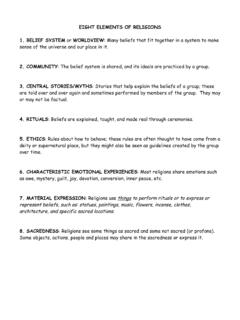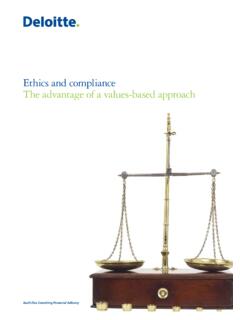Transcription of William K. Clifford THE ETHICS OF BELIEF
1 [Originally published in Contemporary Review, 1877; reprinted in William K. Clifford ,Lectures and Essays, ed. Leslie Stephen and Frederick Pollock (London: Macmillan and Co.,1886). The author (1845 1879) was an English mathematician.] William K. CliffordTHE ETHICS OF BELIEFI. THE DUTY OF INQUIRYA shipowner was about to send to sea an emigrant-ship. He knew that she was old,and not overwell built at the first; that she had seen many seas and climes, and often hadneeded repairs. Doubts had been suggested to him that possibly she was not doubts preyed upon his mind, and made him unhappy; he thought that perhaps heought to have her thoroughly overhauled and refitted, even though this should put himto great expense.
2 Before the ship sailed, however, he succeeded in overcoming thesemelancholy reflections. He said to himself that she had gone safely through so manyvoyages and weathered so many storms that it was idle to suppose she would not comesafely home from this trip also. He would put his trust in Providence, which could hardlyfail to protect all these unhappy families that were leaving their fatherland to seek forbetter times elsewhere. He would dismiss from his mind all ungenerous suspicions aboutthe honesty of builders and contractors.
3 In such ways he acquired a sincere andcomfortable conviction that his vessel was thoroughly safe and seaworthy; he watched herdeparture with a light heart, and benevolent wishes for the success of the exiles in theirstrange new home that was to be; and he got his insurance-money when she went downin mid-ocean and told no tales. What shall we say of him? Surely this, that he was verily guilty of the death ofthose men. It is admitted that he did sincerely believe in the soundness of his ship; but thesincerity of his conviction can in no wise help him, because he had no right to believe on suchevidence as was before him.
4 He had acquired his BELIEF not by honestly earning it in patientinvestigation, but by stifling his doubts. And although in the end he may have felt so sureabout it that he could not think otherwise, yet inasmuch as he had knowingly andwillingly worked himself into that frame of mind, he must be held responsible for it. Let us alter the case a little, and suppose that the ship was not unsound after all;that she made her voyage safely, and many others after it. Will that diminish the guilt ofher owner?
5 Not one jot. When an action is once done, it is right or wrong for ever; noaccidental failure of its good or evil fruits can possibly alter that. The man would not havebeen innocent, he would only have been not found out. The question of right or wrong hasto do with the origin of his BELIEF , not the matter of it; not what it was, but how he got it;not whether it turned out to be true or false, but whether he had a right to believe on suchevidence as was before him. There was once an island in which some of the inhabitants professed a religionWilliam K.
6 Clifford21[In foro conscientiae (Latin): before the tribunal of conscience. (Instr.)]teaching neither the doctrine of original sin nor that of eternal punishment. A suspiciongot abroad that the professors of this religion had made use of unfair means to get theirdoctrines taught to children. They were accused of wresting the laws of their country insuch a way as to remove children from the care of their natural and legal guardians; andeven of stealing them away and keeping them concealed from their friends and certain number of men formed themselves into a society for the purpose of agitating thepublic about this matter.
7 They published grave accusations against individual citizens ofthe highest position and character, and did all in their power to injure these citizens intheir exercise of their professions. So great was the noise they made, that a Commissionwas appointed to investigate the facts; but after the Commission had carefully inquiredinto all the evidence that could be got, it appeared that the accused were innocent. Notonly had they been accused on insufficient evidence, but the evidence of their innocencewas such as the agitators might easily have obtained, if they had attempted a fair these disclosures the inhabitants of that country looked upon the members of theagitating society, not only as persons whose judgment was to be distrusted, but also as nolonger to be counted honourable men.
8 For although they had sincerely and conscientiouslybelieved in the charges they had made, yet they had no right to believe on such evidence as wasbefore them. Their sincere convictions, instead of being honestly earned by patientinquiring, were stolen by listening to the voice of prejudice and passion. Let us vary this case also, and suppose, other things remaining as before, that a stillmore accurate investigation proved the accused to have been really guilty. Would thismake any difference in the guilt of the accusers?
9 Clearly not; the question is not whethertheir BELIEF was true or false, but whether they entertained it on wrong grounds. Theywould no doubt say, Now you see that we were right after all; next time perhaps you willbelieve us. And they might be believed, but they would not thereby become honourablemen. They would not be innocent, they would only be not found out. Every one of them,if he chose to examine himself in foro conscientiae,1 would know that he had acquired andnourished a BELIEF , when he had no right to believe on such evidence as was before him;and therein he would know that he had done a wrong thing.
10 It may be said, however, that in both of these supposed cases it is not the beliefwhich is judged to be wrong, but the action following upon it. The shipowner might say, I am perfectly certain that my ship is sound, but still I feel it my duty to have herexamined, before trusting the lives of so many people to her. And it might be said to theagitator, However convinced you were of the justice of your cause and the truth of yourconvictions, you ought not to have made a public attack upon any man s character untilyou had examined the evidence on both sides with the utmost patience and care.

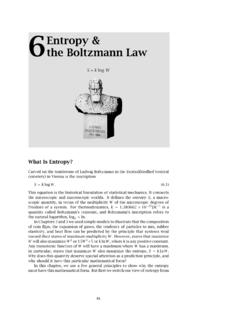




![LINEAR ALGEBRA MIDTERM [EXAM A] - Brandeis University](/cache/preview/2/a/5/a/8/6/f/b/thumb-2a5a86fbead498bbe4749596c75df645.jpg)



